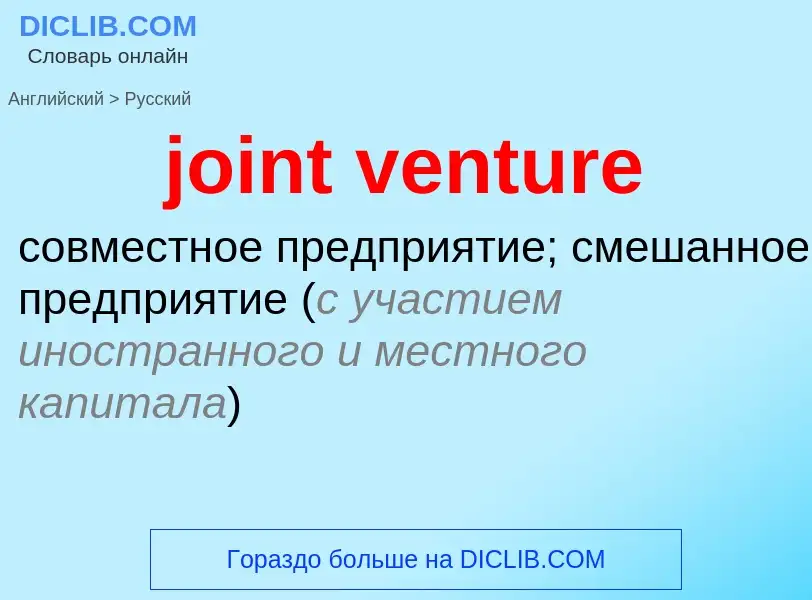Перевод и анализ слов искусственным интеллектом
На этой странице Вы можете получить подробный анализ слова или словосочетания, произведенный с помощью лучшей на сегодняшний день технологии искусственного интеллекта:
- как употребляется слово
- частота употребления
- используется оно чаще в устной или письменной речи
- варианты перевода слова
- примеры употребления (несколько фраз с переводом)
- этимология
joint venture - перевод на русский
общая лексика
JV совместное предприятие
совместная деятельность (юридическая форма предпринимательства без образования юридического лица на основе краткосрочного, однопредметного, разового объединения лиц; в налоговом законодательстве считается разновидностью товарищества)
совместное предприятие
строительное дело
(кратковременное) объединение нескольких подрядных фирм
Смотрите также
Определение
Википедия
A joint venture (JV) is a business entity created by two or more parties, generally characterized by shared ownership, shared returns and risks, and shared governance. Companies typically pursue joint ventures for one of four reasons: to access a new market, particularly Emerging market; to gain scale efficiencies by combining assets and operations; to share risk for major investments or projects; or to access skills and capabilities.
According to Gerard Baynham of Water Street Partners, there has been much negative press about joint ventures, but objective data indicate that they may actually outperform wholly owned and controlled affiliates. He writes, "A different narrative emerged from our recent analysis of U.S. Department of Commerce (DOC) data, collected from more than 20,000 entities. According to the DOC data, foreign joint ventures of U.S. companies realized a 5.5 percent average return on assets (ROA), while those companies’ wholly owned and controlled affiliates (the vast majority of which are wholly owned) realized a slightly lower 5.2 percent ROA. The same story holds true for investments by foreign companies in the U.S., but the difference is more pronounced. U.S.-based joint ventures realized a 2.2 percent average ROA, while wholly owned and controlled affiliates in the U.S. only realized a 0.7 percent ROA."
Most joint ventures are incorporated, although some, as in the Oil and gas industry, are "unincorporated" joint ventures that mimic a corporate entity. With individuals, when two or more persons come together to form a temporary partnership for the purpose of carrying out a particular project, such partnership can also be called a joint venture where the parties are "co-venturers".
The venture can be a business JV (for example, Dow Corning), a project/asset JV intended to pursue one specific project only, or a JV aimed at defining standards or serving as an "industry utility" that provides a narrow set of services to industry participants.
Some major joint ventures include United Launch Alliance, Vevo, Hulu, Penske Truck Leasing, and Owens-Corning.

